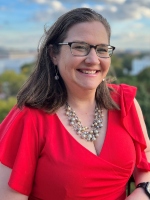By Devon Choltus, MPH, and Kelly Hendershot, LGSW, LMSW
For young adults (YAs) navigating life after a cancer diagnosis, survivorship is an ongoing journey that extends far beyond treatment. Nearly 84,000 YAs are diagnosed with cancer each year in the United States (Miller et al.,2020). The increasing number of young adult survivors can be attributed to an increase in overall incidence of cancer in this age group in the last decade (Miller, et al., 2020). As they return to life after treatment, many young survivors face a unique set of challenges: re-establishing career or academic goals, managing relationships, and coping with the emotional, physical, and psychological impacts of their experience with cancer. Fortunately, a growing number of tailored survivorship support programs and opportunities aim to address these diverse needs, offering young survivors’ guidance, community, and hope for the future.
Cancer Transitions for Young Adults (CTYA)
One valuable program designed specifically for YAs is the Cancer Support Community’s (CSC) Cancer Transitions: Moving Beyond Treatment ® for Young Adults (CTYA) program. Developed to help survivors aged 18-35+ manage the complexities of post-treatment life, CTYA provides a structured yet flexible approach to survivorship. The program covers core issues for young adult cancer survivors such as emotions, relationships, school, work, taking care of yourself, and follow-up care. Through a combination of facilitated, evidence-based sessions and peer support, participants are empowered to take an active role in their survivorship journey.
What sets CTYA apart is its focus on creating a sense of connection. Being part of a group where peers understand the unique challenges of young adulthood and cancer can be incredibly validating. This sense of community, combined with expert-led sessions, helps survivors feel less isolated while building long-term coping strategies.
“For me, the most memorable parts of the CTYA program were making connections with the other participants, sharing our experiences in a judgment-free space, and feeling extremely validated in my experiences and feelings. I resonated so much with what everyone else was sharing and it was very validating and made me feel less isolated.”
-CTYA Participant
Virtual Support Groups: Staying Connected, Wherever You Are
The rise of virtual support groups has opened doors for young survivors to connect with peers regardless of geographic barriers. These online platforms provide a safe space where YAs can share experiences, seek advice, and build lasting friendships. Virtual groups offer the flexibility many young adults need as they juggle work, school, or family obligations, allowing them to access support on their own terms. Visit our location finder to identify the CSC or Gilda’s Club nearest you for more group information.
Another valuable resource is the Cancer in Your 20s-30s forum, hosted by CSC’s MyLifeLine. This forum, which is monitored by licensed mental health professionals, is designed specifically for YAs in their 20s-30s facing cancer, providing a platform for members to connect with others who “get it.” The discussions cover a wide range of topics, from managing side effects to navigating fertility concerns, offering a comprehensive support system for survivors. With frequent updates and active participation, this space is not only educational, but also emotionally supportive.
Helpline Services: Support at Your Fingertips
For those needing one-on-one assistance, the Cancer Support Helpline (888-793-9355) offers a direct link to expert support. The Helpline provides access to specialists, including a financial navigator, a clinical trials navigator, a genetics/ genomics navigator, a pediatric oncology navigator, and a CAR-T cell therapy navigator. The genetics/ genomics navigator on CSC’s Helpline can be a crucial resource for YAs facing concerns about hereditary risks. Our Genetics/Genomics Navigator provides education and navigation for patients and families concerned about issues related to genetics/genomics and cancer, including referrals to resources.
Whether it’s understanding a medical diagnosis, seeking mental health support, or simply having someone to talk to, the Cancer Support Helpline provides a lifeline in moments of need.
The Road Ahead: Continuing to Build Resources for YA Survivors
As young adult cancer survivorship grows, so does the array of resources available to young adult survivors. Programs like CTYA, online forums, virtual groups, and helplines are invaluable resources in helping young people navigate the unique challenges that survivorship brings. The sense of community and expert guidance that these resources offer can make all the difference for YAs as they take charge of their lives after cancer.
By continuing to prioritize YA survivorship support, we can ensure that no young person feels alone in their experience with cancer. Whether through in-person programs or virtual platforms, the tools to build resilience, create connections, and foster hope are more accessible than ever.
If you’re a young adult looking for support, consider exploring some of the programs mentioned in this article and taking the next step toward thriving beyond cancer. To find your local CSC or Gilda’s Club, visit our Find a Location Near You webpage.
Reference
Miller KD, Fidler-Benaoudia M, Keegan TH, Hipp HS, Jemal A, & Siegel RL (2020). Cancer statistics for adolescents and young adults, 2020. CA: A Cancer Journal for Clinicians, 70, 443–459. 10.3322/caac.21637 [PubMed: 32940362]


